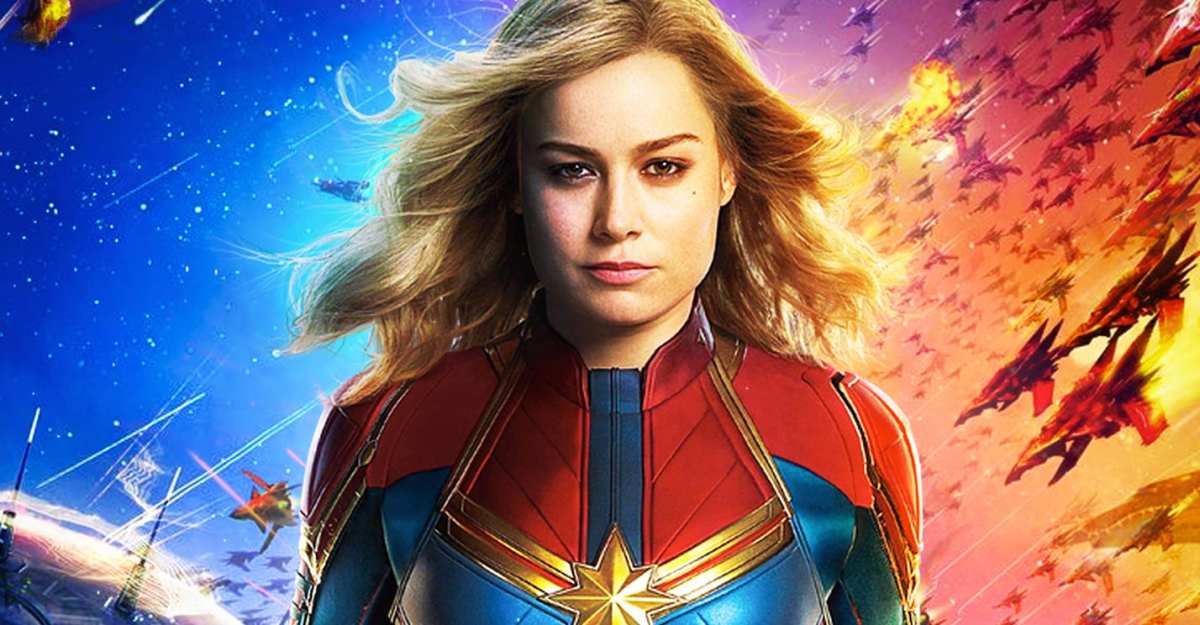With the news that Nia DaCosta (Little Woods, Candyman) will be directing the sequel to Captain Marvel, it is worth reflecting on the original film.
Captain Marvel is perhaps the most archetypal Marvel Studios film. There’s a lot to recommend. It’s a clean and efficient production that largely avoids getting in its own way. It is relatively well cast, propulsive, and accessible. It works well as a delivery method for the same ‘90s nostalgia that drove everything from The X-Files relaunch to the potential Friends reunion special. It’s a movie that is hard to actively dislike, despite the claims of a vocal subsection of the online audience.
There’s also a strange emptiness to Captain Marvel, and it speaks to one of the core problems of the Marvel Cinematic Universe. Captain Marvel is a plot delivery mechanism, seemingly consciously designed to avoid character development or insight. This is frustrating, given that so much of the MCU is built on the original Iron Man as a character study. However, it is the culmination of a trend that might date back to the company’s rigorous cutting of The Incredible Hulk, stripping out a lot of the character work for action.
The basic plot of Captain Marvel is straightforward enough. Vers (Brie Larson) has been living on the Kree homeworld Hala for six years. She serves under Yon-Rogg (Jude Law) as part of an elite military unit that hunts shapeshifting Skrulls. Vers has no memory of her life before Hala. During one mission, she is kidnapped by the Skrull leader Talos (Ben Mendelsohn) and escapes to Earth. There, she discovers an entire past life as Carol Danvers, a celebrated Air Force pilot.

Naturally, there are several big twists. The Skrulls are not really “imposters who silently infiltrate, then take over… planets.” They are “refugees” who just want “a new home.” They are victims of racist Kree propaganda. This flows naturally to the second big revelation — the Kree are the villains of Captain Marvel. Yon-Rogg has been manipulating Carol since she lost her memory as a result of absorbing the power of a prototype light-speed engine — turning her into a potent living weapon.
The problem is that these twists are readily predictable to any viewer with basic media literacy. The publicity material for Captain Marvel identifies Larson’s character as “Carol Danvers,” making it clear that she is human. The character is introduced wearing a green costume rather than the red and blue featured heavily in pre-publicity — green (with due respect to Green Arrow and Green Lantern) being a secondary color traditionally associated at least as much with supervillains as superheroes.
More to the point, the reveal that the human-looking Kree are evil and that the alien-looking Skrulls are heroic is one of the oldest science fiction tropes; it was popular on 1960s shows like The Twilight Zone, The Outer Limits, and even Star Trek. Even more to the point, in the context of the Trump presidency, Captain Marvel was highly unlikely to unironically embrace a plotline that treated dispossessed immigrants as “insidious shapeshifters” who “threaten our borders.”
However, Captain Marvel treats this incredibly obvious and predictable twist as a hinge on which the entire movie pivots. Carol only truly becomes suspicious of the story Yon-Rogg has told her 50 minutes into a two-hour movie. Talos only properly introduces himself to Carol just past the one-hour mark, almost exactly halfway through the film. This is then followed by an extended flashback that properly contextualizes what happened to Carol six years earlier.

This is typical of how the Marvel Cinematic Universe approaches storytelling, treating plot as paramount. Marvel Studios rigorously protects the plots of its films, even those based on existing comic book stories like Infinity War. Actors are routinely given incomplete scripts or decoy scenes or don’t even know what they are filming on a given day. The movies are sold this way, with hashtags like #ThanosDemandsYourSilence or #DontSpoilTheEndgame and talk of a “spoiler ban.”
However, this prioritization of plot has serious side effects. It should go without saying that movies are more than just plot. To avoid undermining the rather obvious twist, the first hour of Captain Marvel has to avoid any characterization. Carol Danvers cannot be a dynamic or proactive character because if she asks any questions about her past, the plot unravels. Instead, Carol becomes a passive character — a person to whom the plot happens, rather than one who makes the plot happen.
As a result, much of Carol’s character is told rather than shown. The rest of the cast describe her character to the audience, rather than Carol demonstrating it. “I know a rogue soldier when I see one,” Nick Fury (Samuel L. Jackson) states. “You got a personal stake in this.” Later, Maria Rambeau (Lashana Lynch) tells her, “You are Carol Danvers.” She then exposits, “You are smart, and funny, and a huge pain in the ass, and you were the most powerful person I knew. Way before you could shoot fire from your fists.” However, Carol never shows the audience this characterization.
This happens with the secondary characters as well. The decision to introduce Yon-Rogg and Talos as potential hero and villain before reversing that dynamic limits what the film can show the audience in the first hour. Captain Marvel would be a much shorter movie if Talos took the first opportunity to explain all this to Carol instead of peddling in creepy clichés like, “You leaving so soon? We’re just getting to know each other.”

Captain Marvel repeatedly emphasizes the importance of Carol accepting her emotions as part of herself, but it has no internal emotional life of itself. How many Skrulls has Carol killed over the past six years? Talos remarks she “crushed twenty of [his] best men” during her escape. What is the emotional reality of that? How does Carol reconcile what she did under Yon-Rogg’s manipulations? How can the Skrulls trust her given she may have murdered their family and friends?
These are difficult questions, but Captain Marvel has no interest in them. Instead, Captain Marvel avoids this with plot maneuvering. It delays revelations and keeps delivering action scenes. It also couches with wry ironic humor. Confronting her former colleague Minn-Erva (Gemma Chan), Carol asks, “You knew all along. Is that why we never hung out?” Her opponent replies, “No, I just never liked you.” This is as deep as Captain Marvel dares to dive into what was a horrific violation and abuse of Carol by people that she considered friends.
This is not an issue unique to Captain Marvel, even if it is most pronounced there. Captain America: Civil War consciously avoids characterization in favor of plot, avoiding any meaningful philosophical disagreement between Tony Stark (Robert Downey Jr.) and Steve Rogers (Chris Evans) in favor of plot mechanics. Tony doesn’t support registration because he believes in accountability; he does it based on an emotional plea from Miriam Sharpe (Alfre Woodard) and is never a “true believer.”
Similarly, Avengers: Infinity War is designed in such a way as to remove any impact of character on plot, reflected in everything from the fact that both Stark and the Ebony Maw (Tom Vaughan-Lawlor) make the same joke about Stephen Strange (Benedict Cumberbatch) looking like he works at kids’ parties through to the fact that the attack on New York begins before Tony is forced to make a choice about reconciling with Steve. Later, Strange confirms the events of the film are literally predetermined.

Why has Marvel Studios taken this approach? Perhaps it is a logical extension of the monetization of spoiler culture. It also seems possible that the emphasis on plot over characterization is a conscious effort to preserve the characters as blank slates onto which fans can project readings. Tony’s principled stand in the comics version of Civil War was incredibly divisive among fans, even if he was probably right, so structuring the film to avoid that potentially disruptive element might be canny brand management.
Befitting its name, Captain Marvel is perhaps the epitome of the approach to storytelling in the modern Marvel Cinematic Universe. It is an approach that is built around the idea that the heart of a movie is the plot and that everything else exists in service of that. The most telling moment in the film might be the revelation that the MacGuffin in Captain Marvel is a literal plot(-defining) engine and that Carol herself is a living manifestation of it.
This is a shame because the best moments in Captain Marvel are the handful of those that exist apart from the plot. The heart of Captain Marvel can be found in those powerful wordless sequences of Carol picking herself up off the ground, not in exposition about Skrulls or Kree or light-speed engines. At one point, Yon-Rogg points to Carol’s chest and directs her, “Stop using this.” It is a shame that the film (and occasionally the larger franchise) appears to have taken the villain’s suggestion to heart.






Published: Aug 9, 2020 02:30 pm